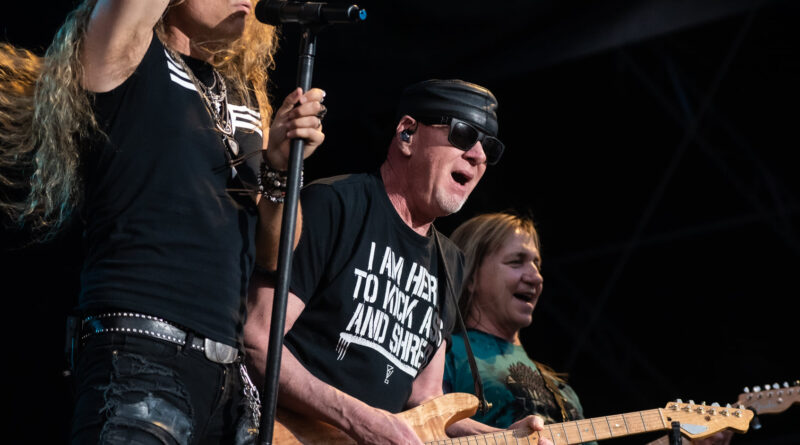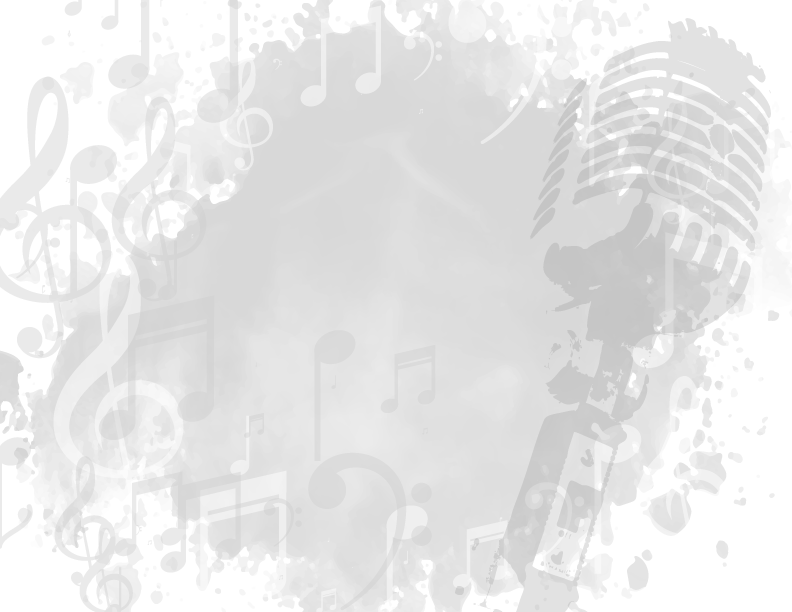Open Waters: A Conversation With Great White’s Mark Kendall
Great White guitarist Mark Kendall is simply enjoying life these days. Gone are the road-dogging, skirt-chasing, drunk-festing days of the 1980s. Been there done that, thanks for the memories.
These days, Kendall is perfectly comfortable hanging out at home with his wife watching “Who In The Bleep Did I Marry?” as he is flying in and out of gigs on weekends. It’s all good. And one can hear it in his California-tinted voice.
Kendall, along with fellow “Wasted Rock Ranger” alum, keyboardist/guitarist Michael Lardie, drummer Audie Desbrow, bassist Scott Snyder and vocalist Mitch Malloy have maintained a steady touring pace over the years, and 2022 should be no different. Iowans will get two chances to see the band front and center when they play tonight (March 25) at the Wild Rose Casino and Resort in Jefferson, and follow it up with a show at the Wild Rose Casino and Resort in Clinton on March 26.
Kendall took time out from binge-watching the aforementioned “must-see” TV to sit down with ListenIowa to talk about the band these days, keeping things fresh after 40 years, and how the band took a turn from Judas Priest wannabes on their first album, to churning out the blues-based tones they’ve become famous for.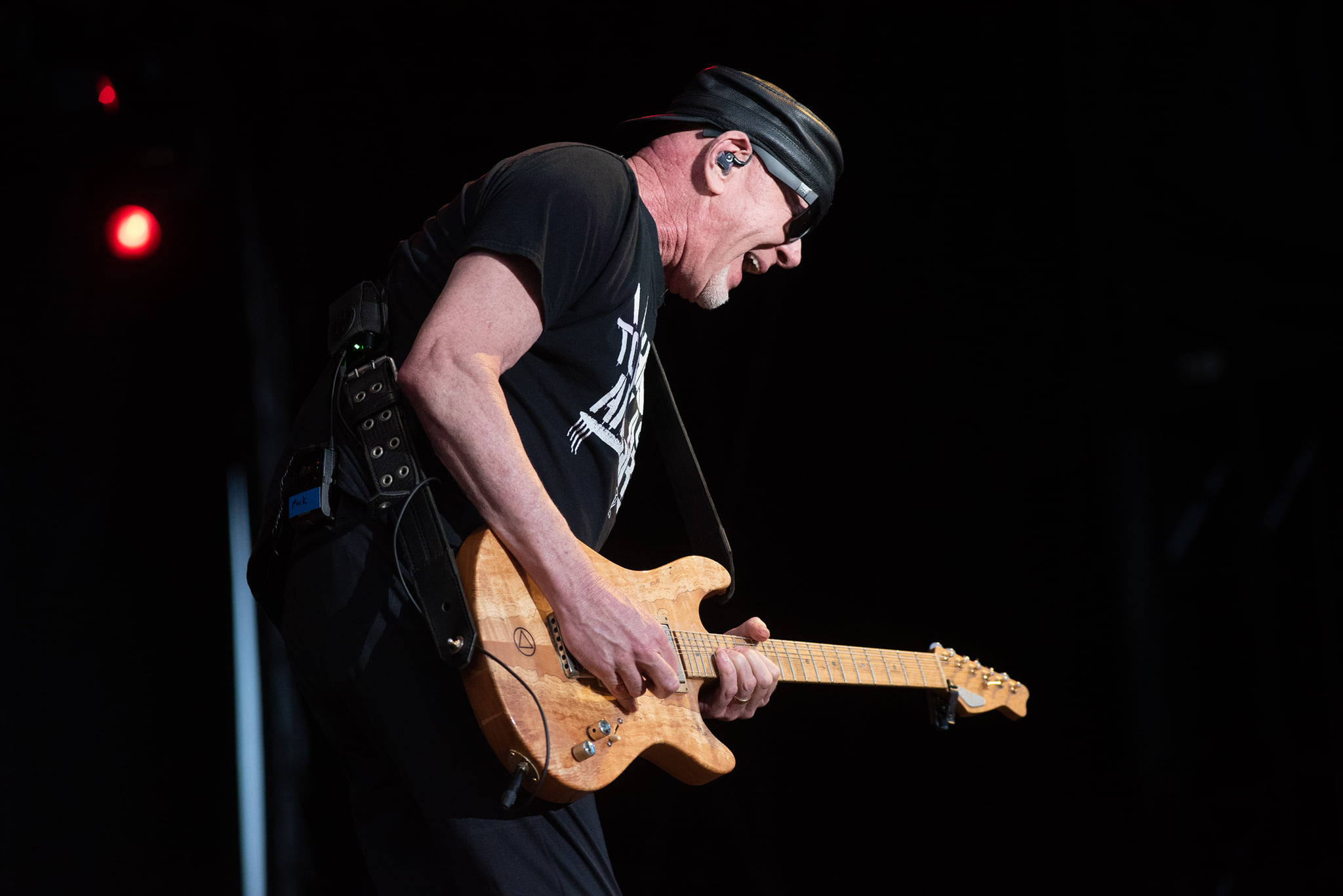
What’s Great White up to these days, Mark?
We continue to write music and tour. It’s little different today in that, instead of getting on a bus for years at a time, we mostly fly to shows and do two or three, go home, and go out and do it again. We try to play 60-70 shows per year, where it used to be play five nights a week in arenas on long tours. The landscape is different, and it’s a changed world, not having record stores, and some of the venues we used to have are no longer there. But the fans are loyal, and they’re still coming to the shows.
Some artists have been saying that this new way of doing things is actually more productive and better financially for them than when they were doing 250 shows a year. What have you found?
One thing I’ve noticed is, all the bands we’ve played with, everyone is playing great. All the time. As far as the logistics and revenue, back then, we were doing a lot of work but being really free with our dollars. Staying in the greatest hotels in the world and things like that. We could break even on a tour and still be fine because we were selling millions of records and moving merchandise. When you strip that away, and people are downloading your music, then that part of it gets erased, and it’s a little more difficult to survive if you go out on a bus and have overhead of paying the drivers, crew and everything else.
What did that look like at the apex of Great White back in the 80s?
We had a 30-man crew at one time. Three busses, two huge trucks, a merchandise Ryder truck on the road with us. It’s expensive. And the major labels have merged together, too. I went to Hollywood one time and was showing Geffen some stuff that I did, and there were five labels in one building! You call down there, and they answer, “Universal, Capitol, Atlantic …” and these names. It’s harder for them to survive because bands no longer need million dollar advances. They’re recording albums in their bedroom. It’s a whole different landscape.
What pushes you to keep going through all these changes?
We keep our energy up by continuing to write music. Try to better what we did in the past.
When you look back on those “glory years” in the 80s now, what do you remember?
I’m a fan. I’m a huge guitar fan. As a teenager, I was going from guitar player to guitar player. It started out that Carlos Santana was the greatest guitar player I ever heard in my life. I wanted to be him. Then I jumped up to guys like Johnny Winter and Alvin Lee and Billy Gibbons. Then you put my influences together with the influences in the band. My singer was into Led Zeppelin. My keyboard player was more into the lighter side of rock like Billy Joel. When we played together, it just made a sound. I think influences have more to do with how we sound than anything. I hear journalists just pretty much call the whole decade, “hair metal.” In a way, that’s pretty shallow. It tells me they aren’t really listening to what we’re doing. They could evaluate it better, rather than just talking about our hair.
Agreed.
So I think the decade was pretty strong. Toward the end, it may have gotten a little bit watered down, but that was just the major labels wanting their version of Dokken or Motley Crue or Ratt. So then it became a little more predictable. You almost knew what the lyric was going to be in advance.
You guys had a couple of ballads, too, which became the norm of what the record company’s were looking for. 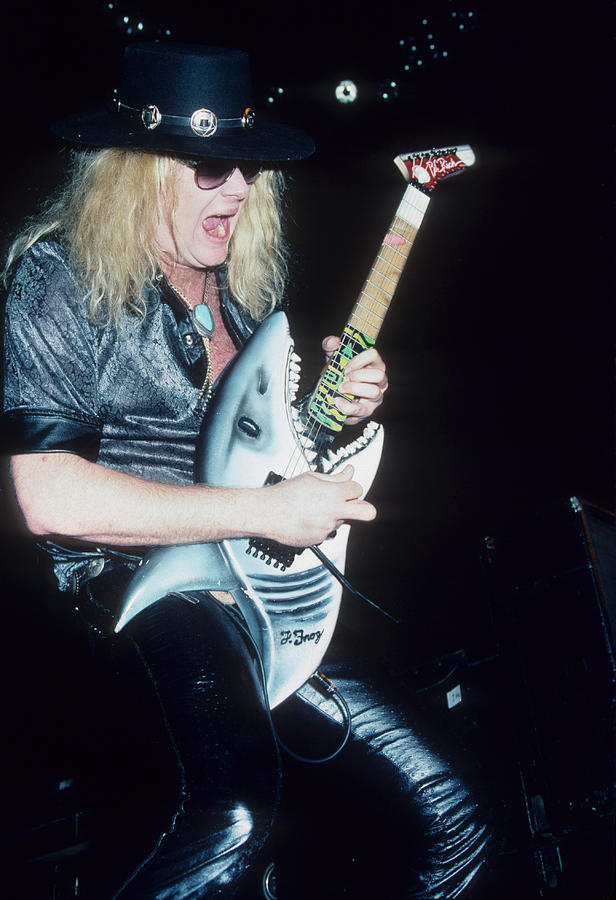
We never planned anything in advance on what kind of record we were going to make. I just came up with a bunch of riffs and showed them to the band, and either they liked or they didn’t. We never sat down and said, “Hey, what kind of record should we make?” We’ll write 20 or 30 songs and pick the best 12. Then we’ll title the record later. We’ve never titled a record in advance. It’s actually that stupid simple. The best songs make it, and the ones that aren’t that good, don’t.
You’re a player who is very steeped in the blues, and Great White is a good outlet for that. But have you ever thought of stepping outside those bounds of a band setting and make the true blues album that you may have wanted to make all this time?
In 2002, we decided to take a hiatus. I was going to make a solo album, but I ended up writing a couple of songs with a guy who was a better singer than me, so I decided to make it a band project. I got the keyboard player for Eric Clapton and some other musicians, and we made a record called “Train Station.” But then I figured, if I’m not singing, how can I call it a solo album? So in 2005, I made a solo album called “2.0.” That was all me singing. I got the bass player who used to play drums for Tower of Power, but he moved to bass. He’s one of these who probably never played Little League as a kid. He played world class piano, too. He played piano like Satan. I was just tripping on this dude. The record turned out great, but it was really challenging singing. I really got a lot of respect for singers. That was a nightmare. If you really listen to record, you’ll hear what I bring to Great White. If you take me away from Great White, it’s just kind of blues rock.
You and your former singer were a huge part of Great White’s sound. You have a different vocalist now, Mitch Malloy. He seems to be a good fit.
Yeah, that was definitely not by design. I ran into him in Nashville. Michael Wagener (producer) brought us together, actually, for this gang shout thing on a recording. Guys like Pat Travers, Slaughter, Winger, everybody who was in Nashville. Mitch was part of that group. And then I met him again on the Monsters of Rock cruise. Then I read an article on my phone at home and he popped up again, this time in a Van Halen story. Somebody had sent me a picture of me and him onstage. He and the guys from Y&T and a bunch of other people came on stage to sing the choruses of “Once Bitten Twice Shy.” He kept popping up. So it made me interested in listening to him to see what he sounded like. You could see in that picture, it looked like it fit visually. So I looked into his solo career, and man, this guy has pipes! So I talked to my keyboard player (Michael Lardie), and we got him down to jam for three days. We got a long real good, and we got along real good. He really comes with the energy every night.
It has to be nice to be able to look to your right and see Michael still there after all these years.
And Audie. He’s been in the band since 1985. He’s played on every record except the first one. You put us three together and you’ve got something like 120 years. (Laughs)
But it’s a great sounding 120 years.
Our personalities are so different, and that’s why we get along. Everybody’s got their own thing. Nobody is aggressive or weird or anything. Real chill.
You guys were touring with the Scorpions sometime in the late 80s. I was at one of the shows, and instead of you being there, it was Al Pitrelli. There were rumors that it was some kind of serious health issue. Can you expand on that?
I had a hiatal hernia. The tube that goes into your stomach, there was a callous on it, and it just decided to explode. I drank a lot of beer over the years, and I asked the doctors if it was alcohol related, but it wasn’t. It was just this weird callous-type thing that burst. I guess I kind of bled inside. It took me three weeks to recover. Pitrelli was on the Alice Cooper tour at the time, and we felt like he would be a good replacement so we wouldn’t have to cancel the tour. So he came out and helped us out. I came back for the Monsters of Rock show. It’s the only time I’ve ever not been physically able to play.
I was just listening to Great White’s first album on vinyl, and loving it. Is there any chance you’ll bring out any of those songs at any time in the near future. Maybe “Substitute,” or “Stick It?”
We haven’t done those for quite awhile. We were kind of a different band then. We were more of a trio, with bass, guitars and drums. We were very young when we did that record. We were trying to be like Judas Priest, and weren’t really being honest with ourselves. We give it our best effort to be like Judas Priest, but didn’t even come close. (Laughs) Back then, we were working in Jack’s (Russell) dad’s factory. We had to wear safety goggles and helmets and ear muffs and all that stuff. We used to listen to Accept and old Scorpions and Judas Priest on the way to work. We were so young that, in our minds, we thought it was the way to go. We didn’t even get close. (Laughs)
There was a big difference between the first and second albums. You veered away from the more metal sound to a more blues-based approach. How did that happen?
When we were doing that first album, in between takes I was noodling around playing stuff like “I’m Going Home” by Alvin Lee, all this blues stuff. And our manager said, “You should be doing that. That sounds way more natural.” And I was like, “Really? You mean I can do what I want?” So that’s why, by the time we got to the next albums and you started to hear things like “Rock Me,” that was like, totally straight from my influences. That was the real me. I wasn’t having tunnel vision trying to be like somebody. It seemed like everything I was coming up with, people liked. It seemed like my world got bigger. The funny thing is, right when we started playing from the heart, showing our influences, we found success. When we were trying to sound like Judas Priest, we got dropped off the label. (Laughs)
So what I’m hearing is we shouldn’t expect to hear any songs off that album in the near future.
Oh, I still love that album. My kids love it. They play it every once in awhile. I’m proud of it. Plus, it was our introduction to Michael Wagener, who is so iconic.
Are you guys working on any new music these days?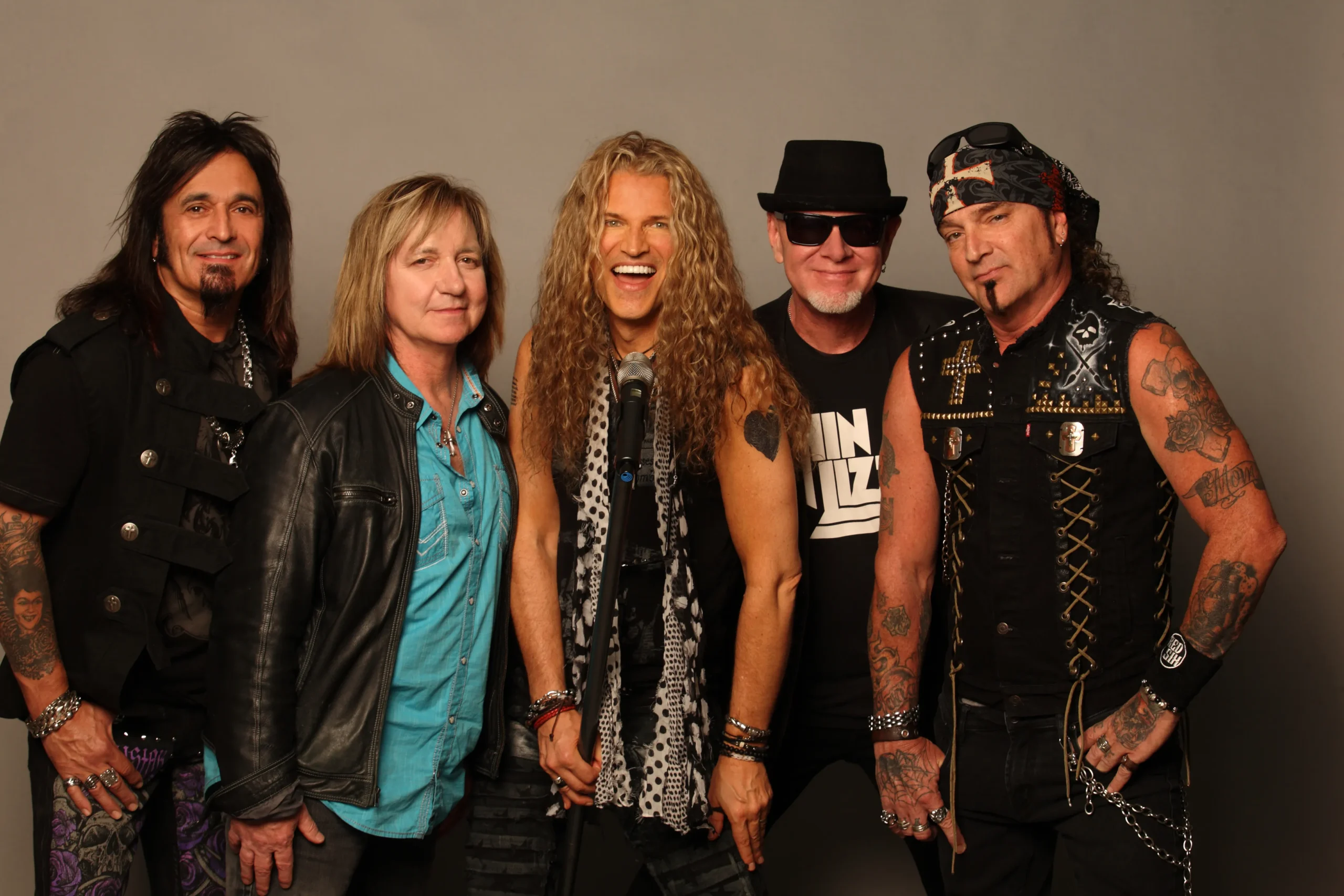
Tons of it. I’ve been saying it for two years, but that pandemic got us out of everything except for writing. We’re going to try to get it done this year. It’s been too long since we made our last record. We’ve got some great stuff. Tracy G, who was Dio’s guitar player for six of seven years, has a studio, and we’ve been going there and putting riffs on tape and stuff.
That’s where Traci disappeared to. He was with Dio, then just kind of disappeared.
Yeah, he finally told me what happened because I was wondering that, too. Traci has always been a one guitar guy, and Dio wanted to add another guitar player, Craig Goldy. Traci just couldn’t do it. He also had a band called World War III with Jimmy Bain and Vinny Appice after that.
So what will we be hearing and seeing on your dates here March 25 and 26?
Everything they want to hear, they’re going to hear. We have some extended jams, just to keep things fresh for us, too. It’s high energy, and hopefully people will go away feeling like they got their money’s worth. (Laughs)
By Darren Tromblay
Photos 1 and 2 by Darren Tromblay

